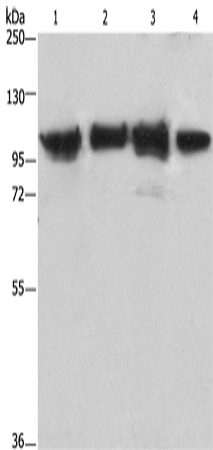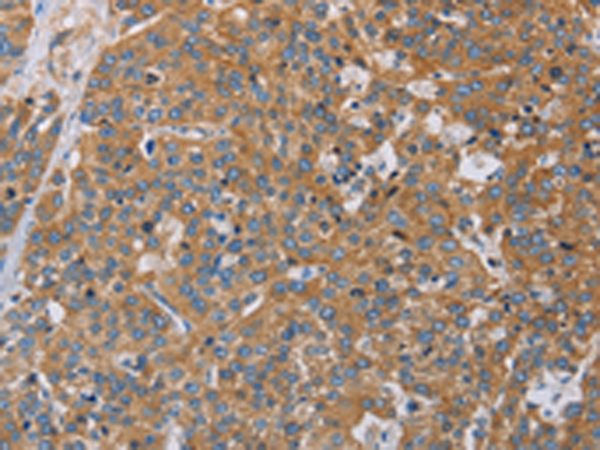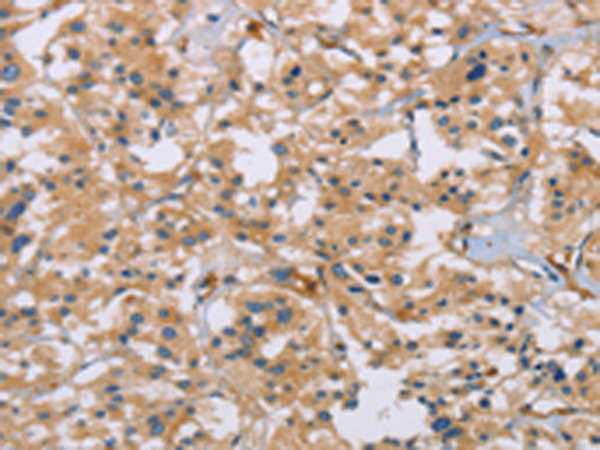


| WB | 咨询技术 | Human,Mouse,Rat |
| IF | 咨询技术 | Human,Mouse,Rat |
| IHC | 1/50-1/200 | Human,Mouse,Rat |
| ICC | 技术咨询 | Human,Mouse,Rat |
| FCM | 咨询技术 | Human,Mouse,Rat |
| Elisa | 1/2000-1/5000 | Human,Mouse,Rat |
| Aliases | FSGS; FSGS1; ACTININ-4 |
| WB Predicted band size | 105 kDa |
| Host/Isotype | Rabbit IgG |
| Antibody Type | Primary antibody |
| Storage | Store at 4°C short term. Aliquot and store at -20°C long term. Avoid freeze/thaw cycles. |
| Species Reactivity | Human, Mouse, Rat |
| Immunogen | Fusion protein of human ACTN4 |
| Formulation | Purified antibody in PBS with 0.05% sodium azide and 50% glycerol. |
+ +
以下是关于ACTN4抗体的3篇参考文献摘要:
1. **文献名称**:*ACTN4 mutations cause focal segmental glomerulosclerosis*
**作者**:Kaplan JM, et al.
**摘要**:该研究首次发现ACTN4基因突变与家族性局灶节段性肾小球硬化(FSGS)相关,通过免疫荧光和Western blot验证突变导致ACTN4蛋白异常聚集,提示其在维持足细胞骨架功能中的关键作用。
2. **文献名称**:*Alpha-actinin-4 enhances colorectal cancer metastasis by suppressing focal adhesion turnover*
**作者**:Honda K, et al.
**摘要**:研究揭示ACTN4过表达通过稳定黏着斑复合体促进结直肠癌转移,利用特异性抗体证实其与黏着斑蛋白相互作用,为靶向ACTN4的癌症治疗提供依据。
3. **文献名称**:*ACTN4 regulates nuclear translocation of NF-κB and promotes breast cancer cell migration*
**作者**:Khurana S, et al.
**摘要**:该文献证明ACTN4通过调控NF-κB核转位增强乳腺癌细胞侵袭能力,采用免疫共沉淀和免疫组化技术显示ACTN4与NF-κB通路蛋白存在直接互作。
The ACTN4 antibody targets α-actinin-4. a cytoskeletal protein encoded by the ACTN4 gene. Belonging to the α-actinin family, ACTN4 is an actin-binding protein involved in cell adhesion, motility, and intracellular signaling. It stabilizes actin filaments and links them to cellular structures, playing key roles in maintaining cell shape and facilitating mechanotransduction.
ACTN4 is notably expressed in podocytes of the kidney, where it supports the structural integrity of the glomerular filtration barrier. Mutations in the ACTN4 gene are linked to familial focal segmental glomerulosclerosis (FSGS), a condition causing progressive kidney dysfunction. Beyond renal pathology, ACTN4 is overexpressed in various cancers, including ovarian, breast, and lung carcinomas, where it promotes tumor invasion and metastasis by enhancing cell migration.
The ACTN4 antibody is widely used in research and diagnostics to detect ACTN4 protein levels via techniques like Western blotting, immunohistochemistry, and immunofluorescence. It helps elucidate ACTN4's role in disease mechanisms, assess its potential as a biomarker for cancer prognosis, and explore therapeutic strategies targeting its dysregulation. Studies also leverage this antibody to investigate ACTN4's interaction with signaling pathways, such as TGF-β and Wnt, in pathological contexts.
×